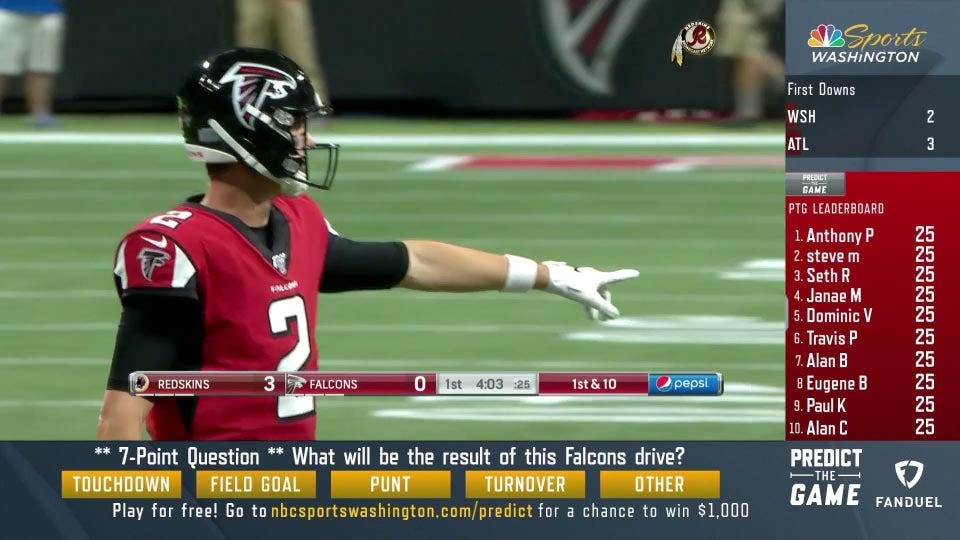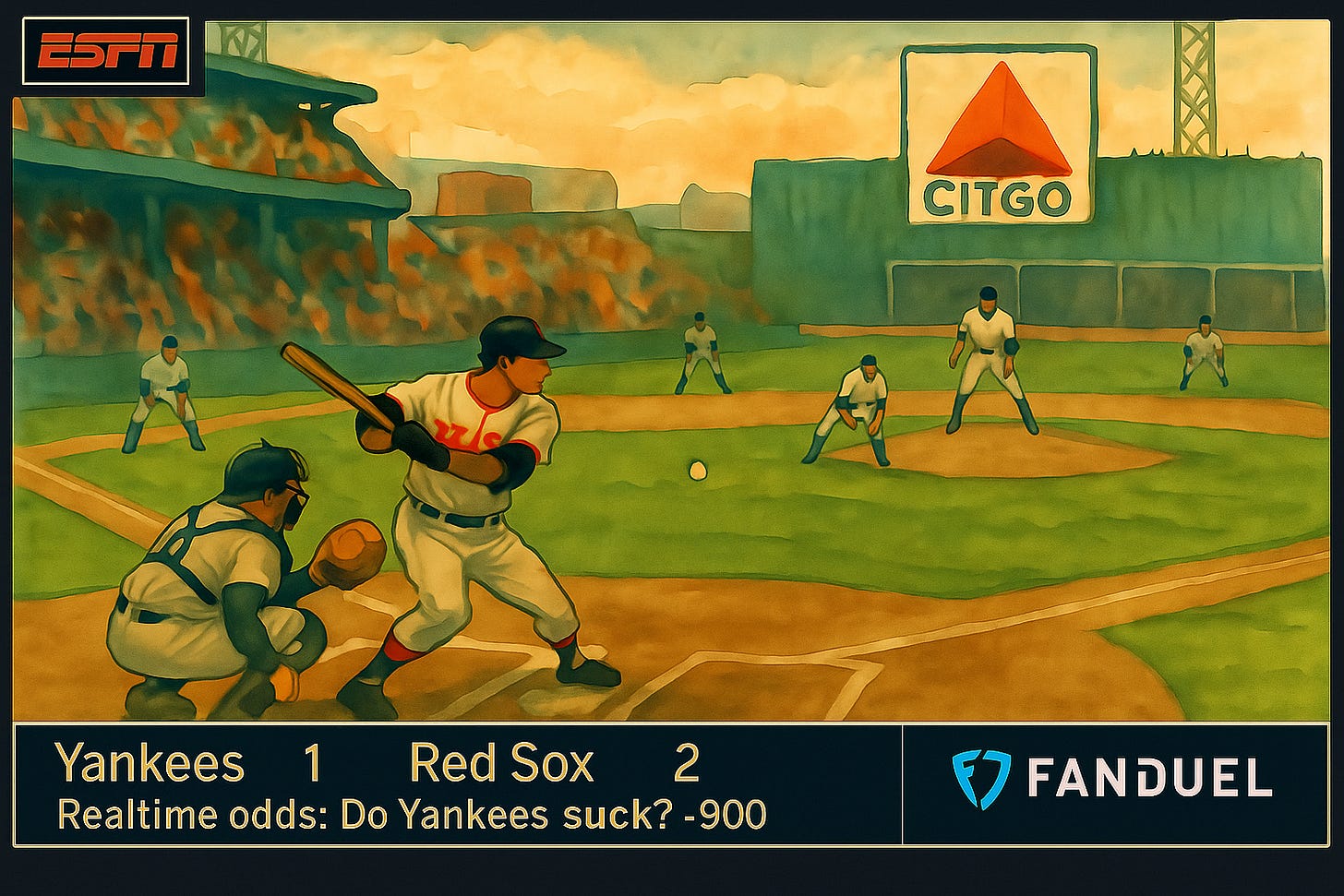Whales are the soft underbelly of the online gambling juggernaut
Fan Duel, Draft Kings, and others are highly vulnerable to modest policy reforms that limit acute harms
It’s the whales, stupid
Since the Supreme Court ended the national ban on sports betting, the floodgates have opened. Legal sports betting is now available in 38 states, plus DC and Puerto Rico. Roughly 30 states allow mobile / online apps, with some gray areas in certain states. In 2024, US companies made about $13.78B in revenue on $149.9B in bets. Incredibly, 48% of American men 18-49 have online gambling accounts.
Gambling is, of course, highly addictive for many people and quietly destroys lives and families, with limited personal or social benefits (and I do think ‘fun’ is a valid upside to consider). Research has started to arrive showing serious harms since legalization, including a big increase in bankruptcies, delinquencies, and debt collections in states that legalized online gambling vs those that didn’t. In states that did, bankruptcies rose by about 10% overall, and for people who are actually betting authors estimate the rate is 5X-10X higher than that.
I’ve started doing some work on this issue recently because I believe the online gambling industry is much more vulnerable than most people realize. While it may be hard to fully ban online gambling in the states that have already legalized it, there are smarter, politically achievable paths to eliminate most of the acute harms and end the industry’s cultural takeover.
Fundamentally, the online gambling industry is built on exploitation of a small slice of the population: the top 10% of online gamblers, “whales”, generate 80% of industry revenues and the top 1% generate 36% (report). These are also the people experiencing the most acute harms.
David Sasaki works on gambling issues at the American Institute of Boys and Men. He writes, “Sports betting is fairly harmless for most users, but incredibly harmful for the minority who develop an addiction they can’t afford.”
Unlike the morass of the drug war, online gambling is highly susceptible to policy intervention. What happens to the industry’s power if you provide even the most basic protections to these people and their families?
Gambling has taken over sports broadcasts
Sports broadcasts now often include betting odds and ads encouraging betting on individual moments of the game. In the short-term, these ads drive app downloads and bets and in the long-term they build the idea that the activity of watching sports should include betting.
Many sports fans find the sudden turn of professional sports toward gambling to be a tragic development. A friend told me recently that all the in-game gambling promotion ‘has crowded out so much of the fun of following sports for me’.
JR Moehringer published a piece the other day about sports gambling in the NYTimes, The Tragedy That Has Befallen Baseball:
Virtually overnight, Major League Baseball entered multiple partnerships with the gambling industry, permitted stadiums to be plastered with ads for gambling entities and betting apps, and even allowed sports books to operate at some of our most sacrosanct baseball cathedrals, including Wrigley Field, which is like nailing slot machines around the rim of the Grand Canyon.
When an industry rises like this, it drives a spiral of increasing power— huge revenues lead to more advertising and more industry lobbying and campaign donations. Ad revenues flow to sports teams, stadiums, and broadcasters while taxes flow to state governments, all of which aligns everyone in the same direction: more, more, more. The dramatic growth in the past few years could make you think this juggernaut has become unstoppable— “If we ban gambling in our state, we’ll lose millions in funding for schools!”
But as Charles Fain Lehman recently wrote on his substack, there is a backlash arriving:
Americans are growing more concerned about what sports gambling is doing to their country. In one recent poll, 58 percent wanted the federal government to “aggressively” regulate betting. Nearly two-thirds backed the SAFE Bet Act, a proposal from Democrats Rep. Paul Tonko and Sen. Richard Blumenthal that would impose stringent federal oversight. While a majority still favor legal sports betting, they also say that it should be illegal to bet on college sports, according to a recent AP-NORC poll.
Sports gambling momentum is more precarious than it seems
Advertising is always an auction. The seller has viewers or users they can put ads in front of and whoever pays them the most gets their ad shown.
For online ads, the auctions happen in real-time, with everyone who might want to reach a user competing to see who is willing to pay the most. The same dynamic is true for TV ads, billboards, and all the places in televised sports where a logo can be squeezed in.
When an online gambling service buys ad space, they are bidding against everyone else: car commercials, soap brands, insurance companies. To win the slot, the business must expect more value from that placement than its rivals do.
I spent years developing mobile apps and the user acquisition side of the business is brutal. If an app earns $6 on average per download, you will often have to bid $5.75 or sometimes even $6 to get a download— doing so is the rational path to growth, as painful as it is to have nearly all your income going out to ad sellers (And this explains why app stores and ad sellers like Meta and Google suck up most of the potential profits from app businesses.) The same dynamic is true for advertising physical products online and buying TV ads.
Now put yourself in the shoes of an online gambling app, trying to grow users and increase betting rates: you want to bid enough to get your ad out there without losing money. So if you are willing to pay $5.00 for a download or $500,000 for a TV placement, you must expect to generate at least that much value from those ads. If an insurance company sees a higher ROI from their TV placements than yours, they will bid $550,000 to get that in-game placement instead of you.
Online gambling companies spend hundreds of millions a year on ads and their gross profit margins are only around 10-15%. That means that even a modest increase in ad cost or decrease in revenue per user will make national ad buys unprofitable. And crucially, online gambling is still banned in a 12 states, including the two biggest markets, California and Texas. That means the ability for online gambling companies to run national TV campaigns and in-broadcast placements is very precarious: they are paying to run ads that appear even in states where their service is blocked. They are carrying substantial dead weight already.
If these companies lose access to a few more key states or if revenue per user drops even modestly, their ability to outbid other industries for national ad placements will end, and so will the financial engine that’s driving the cultural adoption of gambling as a core activity of sports fandom. Online ads, which are targeted to specific user locations, don’t have the deadweight problem of advertising to ineligible users, but they are just as sensitive to revenue per user: a small decline in expected earnings per download could make most of the user acquisition activity of online gambling companies unprofitable.
Common sense is the shiv
At CASPR, we’ve started talking with a coalition of organizations and individuals who are interested in preventing the most severe harms of online gambling.
We can win if we lead with politically appealing proposals that focus on common sense reforms rather than blanket bans. Nothing sounds more boring than the phrase ‘common sense reforms’, but strategically this will achieve more progress, faster— it is not a path of compromise. Proposing broad access bans or blanket ad bans will, in most states, stoke fears of lost tax revenue, draw in armies of lobbyists from gambling companies and sports teams, and pull you into a ‘prohibition vs freedom’ debate that will distract from the reality of the devastating spirals that are happening every day in homes around the country.
What makes this strategy so effective is that ‘common sense’ is firmly on our side. If you apply any common sense to the online gambling industry, it will shrink to a fraction of it’s current scale and lose its cultural power along the way.
Again, the top 10% of online gambling spenders drive 80% of the revenue and suffer the most harm. Reform campaigns should focus specifically on preventing harms to the heaviest users.
Just take a few of the pieces below and think about how they might fit together:
Most states allow credit cards to be used for online gambling apps. Why?
Most states don’t require people to prove they are the sole owner of a bank account in order to connect that account to a gambling service. This loophole means that joint bank accounts can be drained rapidly without mutual notification or permission. How many marriages would be saved if this were fixed?
In most states, there are no requirements to intervene when users show addictive, escalating betting behaviors, there are no caps on how much people can bet per day or per week, and no cooling off periods after bettors experience significant losses. Basic guardrails would benefit everyone, particularly users at risk of escalating their betting beyond what they can afford.
There are currently no caps on what percent of your bank balance can be spent at an online gambling app in given day or a week. Banks should be required to create limits.
How many politicians would vote against basic protections for the families being most harmed? How many voters would vote against a ballot measure that provided protections? Not many. And each time you pass a reasonable reform, the size of the industry will shrink and the next reform will become even easier to pass.





Thank you for taking on the gambling industry